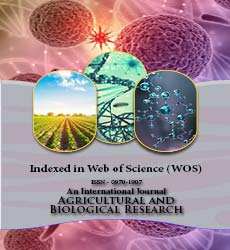Agricultural and Biological Research
RNI # 24/103/2012-R1
Agriculture is a fundamental and steady sector as it generates and supplies raw materials for the food and feed industries. Due to the rising global population, increased nutrient depletion, the need to boost total food grain production, decreasing arable lands, limited water availability, declining soil organic matter, climate change, and various other factors, it is essential to adopt modern technologies like nanotechnology in agricultural sciences. Nanotechnology offers numerous applications across all stages of production, processing, storage, packaging, and transportation of agricultural products. The goal of using nanomaterials in agriculture is to reduce the amount of spread chemicals, minimize nutrient losses in fertilization, and increase yield through improved pest and nutrient management. Key benefits of nanotechnology in agriculture include specific applications like nanofertilizers and nanopesticides, which help in monitoring product and nutrient levels to enhance productivity without contaminating soil and water while providing protection against various insect pests and microbial diseases.
